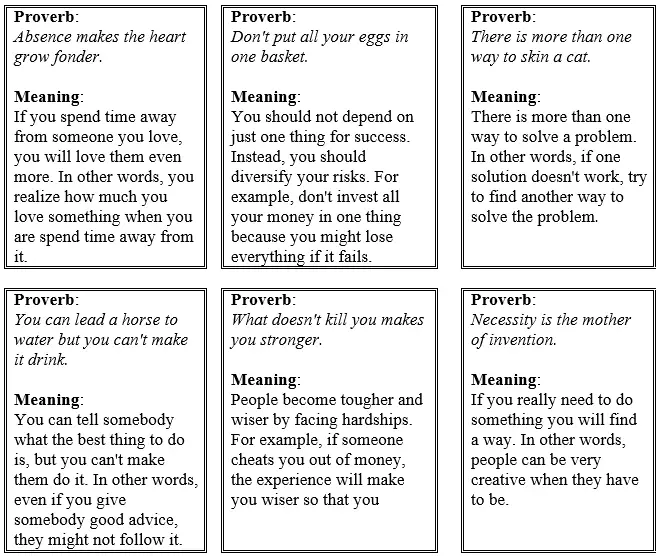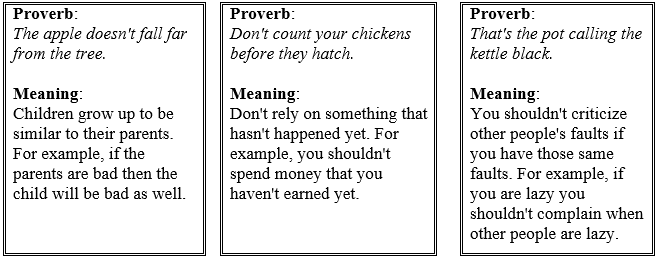English Proverb
In this complete tutorial for beginners, learners will be learn “English Proverb”. What is “English Proverb” defines?. How to communicate common “English proverb” to each other?. What are the examples of “English Proverb”
This lesson is a retelling activity where students can communicate common English proverbs to each other. Every student is given a proverb to speak to the class
I. Objectives: After this lesson the students would be able to:
1. Communicate common English proverb to each other
2. Explain the meaning of proverbs
3. Give examples of proverbs
II. Subject Matter: Proverb Communication
Materials: 1. Proverbs with explanation
2. Student activity sheet
3. Proverb Quiz
III. Teaching Strategies
A. Pre-Activity
1. Word Drill
Proverbs fonder lead invention
Hatch necessity tougher success
B. Activity Proper
1. The teacher writes one proverb on the board and had the student read it.
2. Tell the class that they are going to work on the “Proverbs”
3. Discussion:
3.1 Discuss what a proverb means
3.2 Distribute each student a proverb and tell them to memorize the proverb word for word and to remember the explanation of the proverb in their own.
3.3 After the students have been given time to memorize the proverbs, take away the proverbs and handout the activity sheet
4. Group Activity:
4.1 Divide the class into three or four groups depending on the number of the whole class.
4.2 Each group will go around and talk to other groups and exchange information on proverbs and record it in their activity sheet.
4.3 When the groups are finished exchanging information, give them five minutes to review their activity sheet.
4.4 Have each group presents information they exchange from other groups.
5. Generalization
What is a proverb?
“A proverb is a short saying or sentence that is generally known by many people. The saying usually contains words of wisdom, truth or morals that are based on common sense or practical experience. It is often a description of a basic rule of conduct that all people generally follow or should follow.
Elicit students’ answers and finally write it on the board and have the class read it, then in groups, and point some individual students.
IV. Evaluation/Assessment:
In your own, explain in one or two sentences what these proverb mean.
1. What should you do before you leap?
2 .What shouldn’t you judge a book by
3. What can a leopard not do?
4. What do things that don’t kill you do?
M. L.____
I. D. ____
V. Assignment/ Homework
Have the students pick one proverb that have been studied and let them rephrase their
explanation “using in other words” or to give an example.
VI. Enrichment/ Remediation
For slow learners you can rewrite or rephrase the proverb for them to understand the lesson.
VII. Reinforcement
For fast learners you can assign them to think of a situation in their life that reflects one of the proverbs that have been studied and let them write an experience that reflects this problem.
English Proverbs: Every student is given one proverb to memorize. They should memorize the proverb word for word, but they can explain the meaning of the proverb in their own words.


Proverb Quiz
In your own explain in a sentence or two what these proverbs mean.
1 What should you do before you leap?
2 What shouldn’t you judge a book by?
3 What can a leopard not do?
4 What do too many cooks do?
5What do things that don’t kill you do?
6 What does every cloud have?
7 What shouldn’t you count?
8 What does the pot call the kettle?
9 What doesn’t fall far from the tree?
10 Where should you not put all of your eggs?
11 What do many hands do?
12 What animal can be skinned in many ways?
13 What is the mother of invention?
14 What does absence do?
15 What can’t you make a horse do?
For more readings
- ing Verbs English Lesson and Exercises – ing Forms, Spelling Rules and Grammar
- Present Simple Verb Tense | Present simple English Verb
- Modal Verb Could – Form, Use and Meaning in English
- To and Towards – Confusing English words | Vocabulary
- Conjunctions “And” “But” “Or” and “So”- English Lesson For Beginners
If you have any questions or suggestions about English Proverb, please feel free to leave a comment below or send us a message using our contact page.


